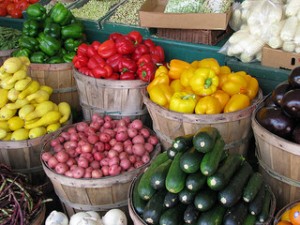Extreme Locavorism
As part of The Decolonizing Diet Project, a new study at the School of Native American Studies at Northern Michigan University, a group of 25 volunteers will spend the next year eating primarily foods that “were part of the Great Lakes diet prior to the year 1600.” As the blog Found Michigan explains:
The purpose of the study is to explore the relationship between humans and regional native foods; components include an ethnobotanist (for native plant identification), a physician (to check up on participants’ physical changes), group outings and potlucks, daily journaling for research subjects, and a master list of “DDP-eligible” foods. So, things like squash, bison, and wild leeks are in; things like tomatoes, cheese, and chocolate are out. What can’t be bought from local suppliers must be grown, hunted, fished, or foraged—meaning your next meal might be waiting in the woods as opposed to the grocery store.
Marty Reinhardt, the lead researcher for the Decolonizing Diet Project, explains how the experiment is related to locavorism:
Yeah, in fact we have folks who are part of the DDP who consider themselves locavores, but they had only thought about things like, where does my food come from, is it raised on a farm locally, how many resources did it take to get from the farm to my plate? But they hadn’t thought about the cultural or geographic origins of the foods. So they were eating local farm-raised beef and not necessarily thinking, where did this beef come from originally? Or, where did that tomato come from? Of course, tomatoes are indigenous American but they’re indigenous SouthAmerican; they’re not North American. And they’re certainly not something that was in the Great Lakes Region until very recently in our history. So we’re causing some folks to reexamine how they think of the local-ness of food.
Our podcast listeners of course already know that locavorism isn’t necessarily good for the environment.
(HT: David Warakomski)


Comments